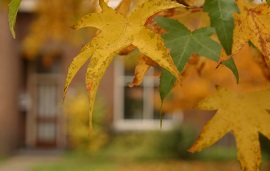Surprisingly, the worst time of year from your air conditioner is winter. Although your system may be working hard throughout the hot summer months, it is actually seasonal weather that can cause the most damage to your air conditioner.
The potential damage to your air conditioner begins as the leaves fall from the trees. These leaves will invariably end up on the grate covering your air conditioning condenser. This outdoor unit is typically located on your roof or next to your home, so it is particularly vulnerable. AC condensers contain coil tubes carrying refrigerant and aluminum fins which are delicately thin to encourage very rapid heat transfer. When fallen leaves lay on your condenser, they can provide an excellent nest for mice and other small creatures.
The Hazards of Winter:
Wet, cold weather can be very detrimental to your air conditioning system. Any leaves or garden debris which has accumulated on your condenser unit will be a magnet for collecting rain water. This means that if the temperature drops, there is a danger of ice freezing inside the condenser. Even if the weather remains mild, the wet leaves will become increasingly heavy and damp, encouraging the growth of mold.
The Perils of Spring:
As spring approaches all of the lovely flowers start to open up and spread pollen and seeds throughout the air. Seed pods can be particularly hazardous to your air conditioner as millions of pounds of these fluffy seeds are released. The hair like fibers which help the seeds to float in the air also ensures that these seeds are widely distributed. Even if there are none of these seed pods in your yard, you may find that your air conditioner is still vulnerable. As the cottony seeds are blown against your condenser, they are likely to embed into the delicate fins, or they may accumulate on spiderwebs to cause a blockage in air flow.
Caring For Your Air Conditioner:
To minimize the damage caused by your air conditioner’s worst enemy, you need to ensure that your system has properly care. Most manufacturers recommend that you have your system professionally serviced at least once per year to preserve your warranty. Servicing will include checking that the refrigerant levels are correct, any minor duct leakage is sealed, motors are lubricated, belts are replaced as necessary, and the accuracy of the thermostat is checked.
Additionally, homeowners can perform some basic cleaning to ensure that the system does not suffer damage between service intervals. This involves carefully removing any leaves, seeds or other garden debris from the evaporative coil and outdoor condenser unit. You should also try to clear any spider webs, which may attract debris. It is also important to keep your landscaping trimmed back to ensure that your unit has sufficient space. It is a good idea to allow at least two feet of clearance around all sides of the unit.
You can also minimize weather damage by using a condenser cover in fall and winter. These covers can protect the unit from rain and garden debris, but you must ensure that you do not operate the air conditioner when the condenser is covered. A condenser requires lots of room to maintain proper airflow. If you turn on the air conditioner while a cover is in place, the restricted airflow could cause the motor to burn out.

